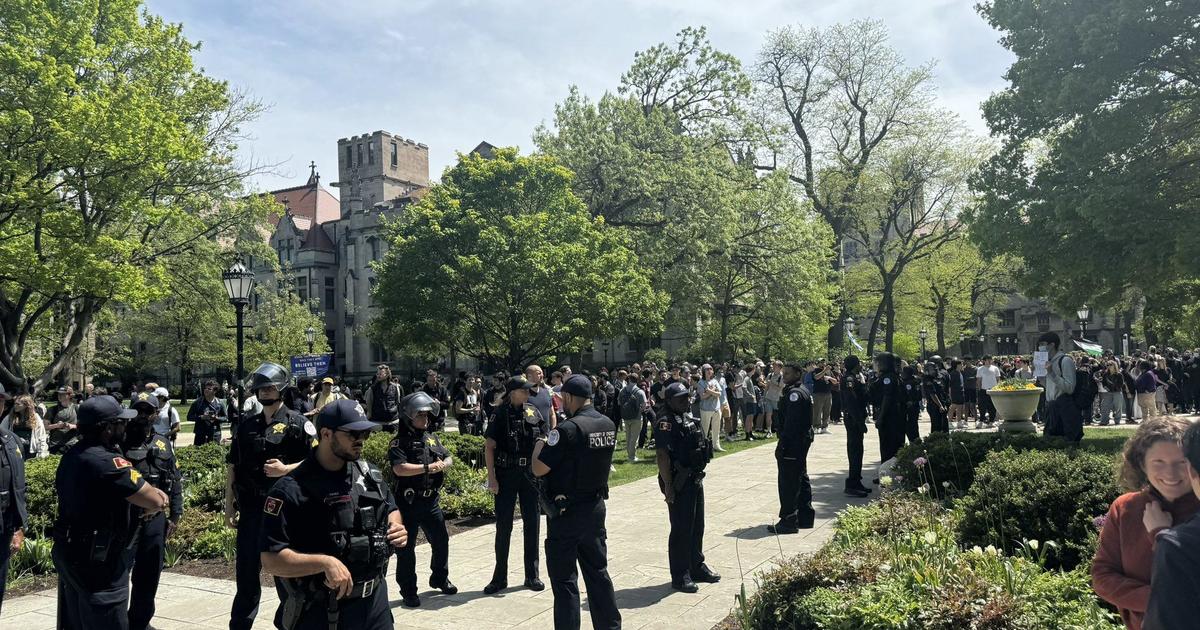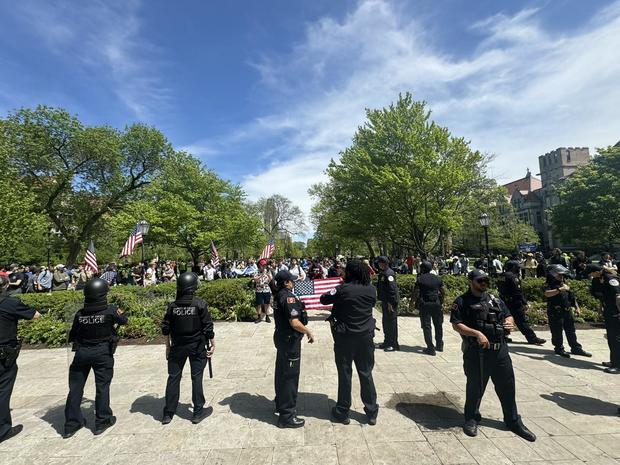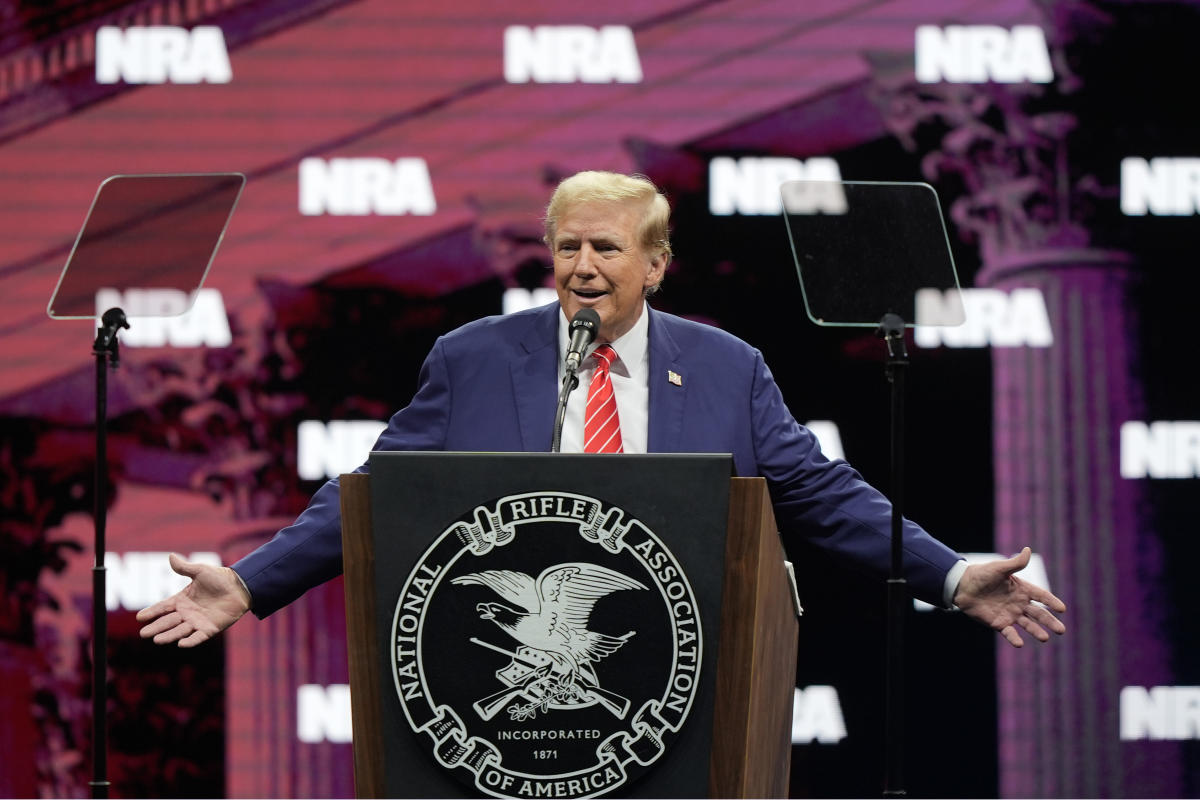CHICAGO (CBS) – University of Chicago police officers separated protesters who are part of the UChicago United for Palestine encampment from a group of counter-protesters after the two groups clashed on the Main Quad of the Hyde Park campus Friday afternoon.
The encampment has been at the U of C since Monday. It was first set up on the Main Quad, just north of Swift Hall, and has continued to grow ever since. The students are part of a nationwide movement calling for immediate divestment from countries that benefit from Israeli companies during the Gaza war.
Photos showed UCPD officers in the center of the Main Quad, separating UChicago United for Palestine protesters from a group carrying American and Israeli flags.
Darius Johnson/CBS2
Chicago police were also on campus. The student newspaper Chicago Maroon reported Friday afternoon that several Chicago Police Department cruisers were parked on Ellis Avenue, about a few hundred yards west of the quad.
Darius Johnson/CBS2
This came after UChicago United for Palestine protesters clashed with a group waving American flags. The Maroon reported that the UChicago United for Palestine group set up wooden and plastic shields and locked arms as they faced the counter-protesters.
Darius Johnson/CBS2
At 1:06 p.m., an alert was sent to the UChicago community warning people to avoid the Main Quad due to reports of “physical altercations.”
UChicago President Paul Alivisatos: Time to end camp
On Friday morning, University of Chicago President Paul Alivisatos wrote that protesters at the camp have been freely expressing their views for more than four days and that he and Provost Katherine Baicker have met with protesters in hopes of finding a way forward.
“As I wrote on Monday, as a matter of principle we provide the greatest possible latitude for free expression, even for expressing views that some may find deeply offensive, even in rare cases at the cost of some policy violations – for a while,” Alivisatos wrote. . “But the camp cannot continue.”
He wrote that the encampment has caused a “systematic disruption” on campus.
“Protesters are monopolizing areas of the Main Quad at the expense of other members of our community. Clear policy violations have only increased. Our students have released a flood of reports about disrupted classroom learning,” Alivisatos wrote.
“Other disruptions include the repeated destruction of an approved installation of Israeli flags, shouting out speakers they disagree with, vandalism and graffiti on historic buildings, building walkways into the encampment and co-opting the flagpole of the university to fly the Palestinian flag.”
Alivisatos added that the camp is growing every day and that police officers have been withdrawn from their patrols to monitor the 24-hour protest.
“Left to its own devices, there is no end in sight, and the disruptions will continue to increase,” Alivisatos wrote. “The encampment protesters have ignored our policies rather than working within them, despite UChicago being an institution that offers many avenues for expressing views.”
For these reasons, he wrote, it is time to leave the camp.
“On Monday, I stated that we would only intervene if what might have been an exercise of free expression blocks the learning or expression of others or substantially disrupts the functioning or security of the university.” wrote Alivisatos. “Without an agreement to end the encampment, we have reached that point.”
In its own statement, UChicago United for Palestine said three students and two faculty members from its organization were part of Thursday’s meeting with Alivisatos and Baicker. The group complained that the university is not meeting its demands.
“During the meeting, the students reiterated their demands to the government: recognize genocide and scholasticism in Gaza, get rid of the genocide in Gaza, make public the university’s investments in weapons manufacturers, and redress the injustices the university perpetuates from Palestine to on the south side,” the group said. wrote.
The group noted Alivisatos’ announcement that it is time for the university to intervene in the encampment. The group’s press release did not specify what action the camp protest participants would take next.
In response to the announcement, UChicago United for Palestine referenced a quote from Palestinian journalist Wael Al-Dahdouh: “We are overflowing with humanity, and our enemy is overflowing with death and resentment, what moves us is humanity, and what moves our enemies what moves is humanity.” hate.”
Mayor Johnson, Supt. Snelling discusses the threshold for sending police to campus protests
Mayor Brandon Johnson was asked Friday about the prospect of sending police protest camps. In addition to the University of Chicago, a similar protest camp has been set up at DePaul University. This was before police came to the UChicago campus Friday afternoon.
“Our ultimate goal is to make sure that people are safe at any time that a demonstration is taking place, and we will continue to assess all of these demonstrations and these moments of demonstration,” Mayor Johnson said. “We are at a pivotal moment in our country’s history, and so protecting people’s First Amendment rights is obviously of paramount importance, but again a full assessment is needed.”
The mayor said Chicago Police Supt. Larry Snelling, chief of staff to Mayor Cristina Pacione-Zayas, and other top aides discussed what can be done if and when intervention is needed. He said they had been monitoring other campus protests across the country, and said he is proud of Snelling’s commitment to constitutional oversight and de-escalation — and to ensuring a safe space for First Amendment protections.
“We will continue to evaluate and assess these demonstrations for the remainder of time, however long they last,” Johnson said.
Snelling said Friday that police are committed to ensuring people can express their right to free speech – while ensuring people’s safety.
“We can talk about the encampments. The question is what happens to the encampments. Is there violence happening in these locations? Are there people in danger?” he said. “Those are the things we would be most concerned about.”
Snelling said police “don’t want to unnecessarily escalate any situation.”
“So we take our time, we assess these situations, and if it’s not necessary for us to go in and try to remove people, then we don’t do that,” he said. “What we will do is rely on those universities and campuses to determine what needs to be done on their end, and we will work with them as necessary to provide them with assistance if necessary.”








